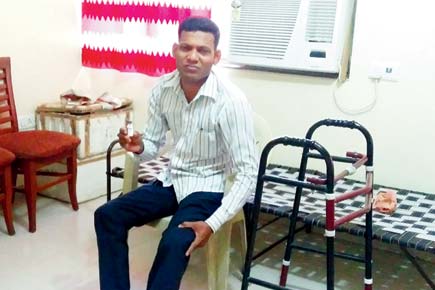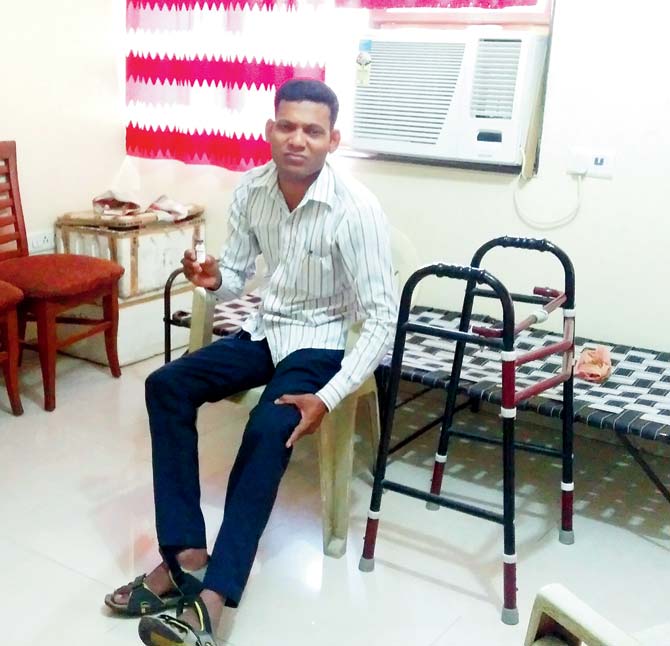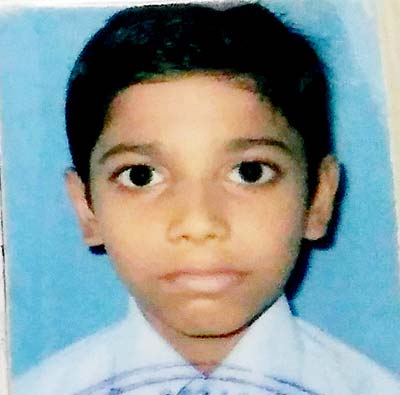Delay in floating of tender puts lives of haemophilia patients at risk, forcing them to spend thousands on procuring the drugs from private set-ups


Mahesh Kadam, a haemophiliac, had to spend Rs 45,000 for the medicine to stop the bleeding in his leg
ADVERTISEMENT
Mahesh Kadam (34), suffering from a rare blood clotting disorder, haemophilia, has been in excruciating pain since the past two days due to sudden internal bleeding in his knee. He has been completely bedridden and dependent on a walker. And he knows that there’s no way out for him as all civic body-run centers have ran out of medicines that can save him from permanent disability.

Alwin Nathao (8) started bleeding internally after falling down while playing
Out of stock
For the past three months, the only centre in the city, KEM hospital, that provides medicines free of cost to haemophilia patients have ran out of stocks. There is a huge shortage of Factor VIII, IX that help in blood clotting, and NovoSeven and Feiba that are given to inhibitor patients who have developed antibodies to the first line of treatment.

Kadam is an inhibitor who requires NovoSeven that costs Rs 45,000 per unit in a private hospital. These medicines are manufactured in Bengaluru and given for free at KEM.
Due to delay in floating a tender, all the centres are suffering from an acute shortage.
Kadam told mid-day, “I am unable to move due to the internal bleeding. Haemophiliacs can start bleeding in the joints or brain any time. It can only be stopped by giving medication on time. I tried getting the medicines from KEM hospital, but they asked me to buy it from Haemophilia Society. Unable to bear the pain, I had to buy NovoSeven for R45,000. I spent my savings on the medicine that I should have got for free.”
Kadam isn’t the only one. Almost all patients from poor families have been forced to pay in thousands to procure the medicines from outside since the shortage in KEM hospital.
Tender delay proves costly
The scheme to provide free medicines to haemophiliacs started in 2012 under the National Rural Health Mission. Every year under the Mission, the health ministry provides state governments the stipulated money for treatment and medicines of the patients. This year too, the fund was released, but due to delay in floating the tender, all the centres are facing the shortage.
“In July, we went with all the files to meet then acting director of Directorate of Health Services (DHS) Mohan Yadav with the request to float the tender, but he insulted us and shooed us off. Since then, until last week, the tender wasn’t floated. The director of DHS, Dr Satish Pawar, has floated the tender, but the delay is already proving costly for so many,” said president of Haemophilia Society Mumbai chapter Balshiram Gadhave.
“We have secured free treatment and medicines after several years of fighting. What’s the point of it all if patients with emergency, like bleeding in the brain, don’t get the right medicine on time? They will die.”
When mid-day spoke to NRHM director Pradeep Vyas, he said there hasn’t been any delay on their part in releasing the fund. “We gave the money on time. Now, it is the responsibility of the state health department to float the tender,” he added.
Govt’s defence
Despite repeated attempts, assistant director of DHS Mohan Yadav didn’t respond to calls. While DHS director Dr Satish Pawar said he wasn’t aware of the situation.
“I don’t know why the tender wasn’t floated. I just resumed last week and have floated the tender. But it will take six to seven weeks to get the medicines in the hospitals. Every year, we float the tender on time,” he added.
A dangerous disease
There are two types of haemophilia — A and B. The first one deals with deficiency of Factor A and the second with Factor B that slow down a person’s normal blood clotting process.
Dr VP Anita, consultant haematologist at Jaslok Hospital, said, “A haemophiliac can bleed severely from joints and the brain. Even without getting injured, s/he can start bleeding suddenly. If a person with internal brain bleeding doesn’t get the Factors on time, s/he can die. There are many who become permanently disabled because they can’t afford regular treatment.”
 Subscribe today by clicking the link and stay updated with the latest news!" Click here!
Subscribe today by clicking the link and stay updated with the latest news!" Click here!






